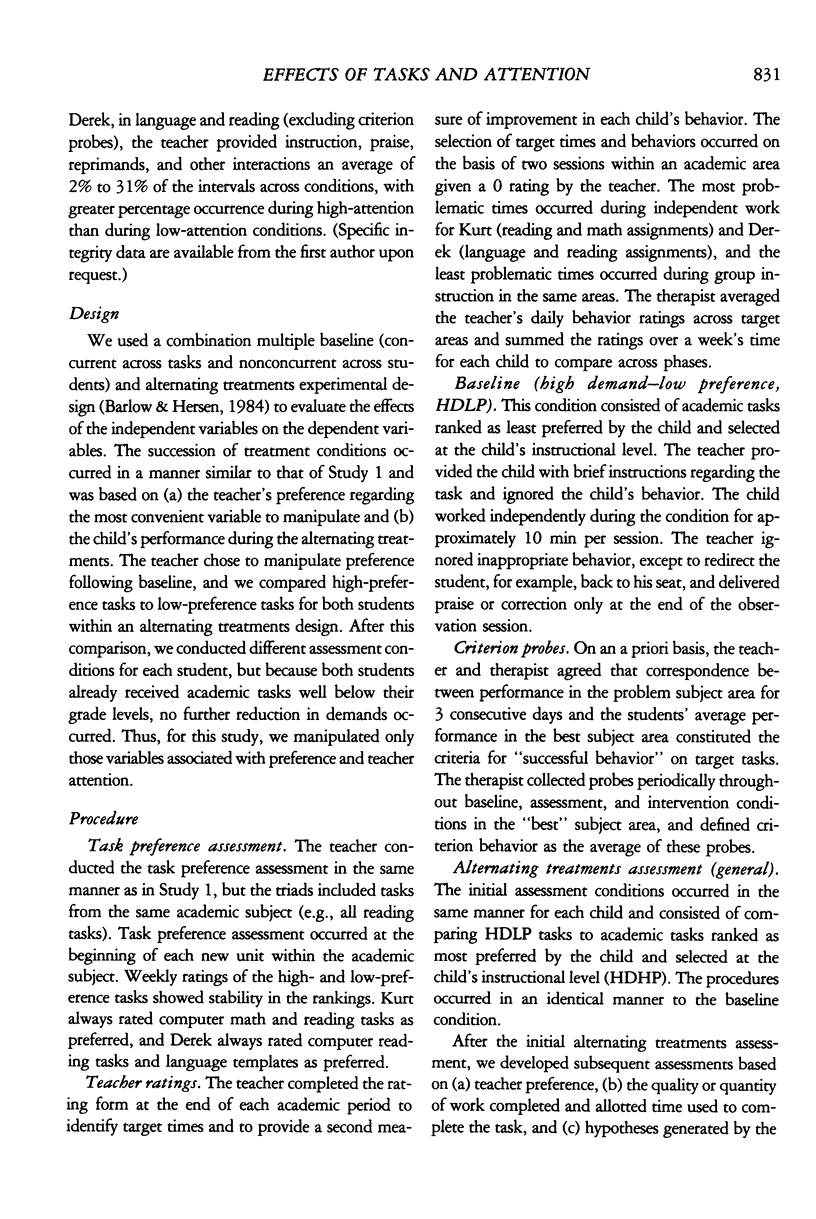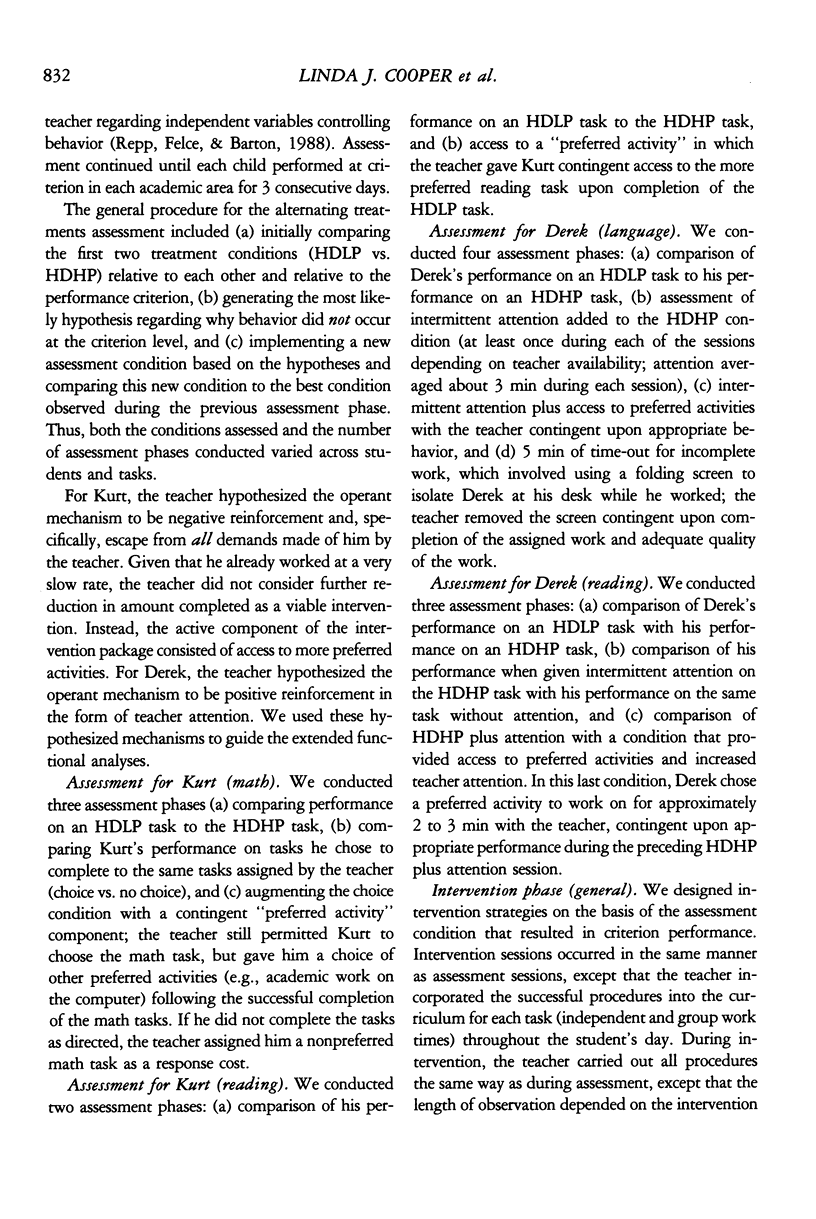Abstract
Two studies were conducted with children who displayed behavior problems to evaluate the effects of task preference, task demands, and adult attention on child behavior. In Study 1, we conducted brief functional analyses in an outpatient clinic to identify variables that facilitated appropriate behavior. For 8 of 10 children, distinct patterns of performance occurred; 3 children displayed improved behavior with changes in task demands, 1 child displayed improved behavior with a preferred task, and 4 children displayed improved behavior with changes in adult attention. In most cases, the children's parents carried out the assessments with adequate procedural integrity. In Study 2, we applied similar assessment methods to a classroom setting over an extended period of time. We identified independent variables controlling appropriate, on-task, and academic behavior for 2 children on two tasks, with slightly different treatment procedures across tasks for both children. In addition, the results of brief functional analyses for both children corresponded to the extended classroom assessments.
Full text
PDF

















Selected References
These references are in PubMed. This may not be the complete list of references from this article.
- Carr E. G., Durand V. M. Reducing behavior problems through functional communication training. J Appl Behav Anal. 1985 Summer;18(2):111–126. doi: 10.1901/jaba.1985.18-111. [DOI] [PMC free article] [PubMed] [Google Scholar]
- Cooper L. J., Wacker D. P., Sasso G. M., Reimers T. M., Donn L. K. Using parents as therapists to evaluate appropriate behavior of their children: application to a tertiary diagnostic clinic. J Appl Behav Anal. 1990 Fall;23(3):285–296. doi: 10.1901/jaba.1990.23-285. [DOI] [PMC free article] [PubMed] [Google Scholar]
- Derby K. M., Wacker D. P., Sasso G., Steege M., Northup J., Cigrand K., Asmus J. Brief functional assessment techniques to evaluate aberrant behavior in an outpatient setting: a summary of 79 cases. J Appl Behav Anal. 1992 Fall;25(3):713–721. doi: 10.1901/jaba.1992.25-713. [DOI] [PMC free article] [PubMed] [Google Scholar]
- Dunlap G., Kern-Dunlap L., Clarke S., Robbins F. R. Functional assessment, curricular revision, and severe behavior problems. J Appl Behav Anal. 1991 Summer;24(2):387–397. doi: 10.1901/jaba.1991.24-387. [DOI] [PMC free article] [PubMed] [Google Scholar]
- Iwata B. A., Pace G. M., Kalsher M. J., Cowdery G. E., Cataldo M. F. Experimental analysis and extinction of self-injurious escape behavior. J Appl Behav Anal. 1990 Spring;23(1):11–27. doi: 10.1901/jaba.1990.23-11. [DOI] [PMC free article] [PubMed] [Google Scholar]
- Mace F. C., Lalli J. S. Linking descriptive and experimental analyses in the treatment of bizarre speech. J Appl Behav Anal. 1991 Fall;24(3):553–562. doi: 10.1901/jaba.1991.24-553. [DOI] [PMC free article] [PubMed] [Google Scholar]
- Mace F. C., West B. J. Analysis of demand conditions associated with reluctant speech. J Behav Ther Exp Psychiatry. 1986 Dec;17(4):285–294. doi: 10.1016/0005-7916(86)90065-0. [DOI] [PubMed] [Google Scholar]
- Northup J., Wacker D., Sasso G., Steege M., Cigrand K., Cook J., DeRaad A. A brief functional analysis of aggressive and alternative behavior in an outclinic setting. J Appl Behav Anal. 1991 Fall;24(3):509–522. doi: 10.1901/jaba.1991.24-509. [DOI] [PMC free article] [PubMed] [Google Scholar]
- Repp A. C., Felce D., Barton L. E. Basing the treatment of stereotypic and self-injurious behaviors on hypotheses of their causes. J Appl Behav Anal. 1988 Fall;21(3):281–289. doi: 10.1901/jaba.1988.21-281. [DOI] [PMC free article] [PubMed] [Google Scholar]
- Wacker D. P., Steege M. W., Northup J., Sasso G., Berg W., Reimers T., Cooper L., Cigrand K., Donn L. A component analysis of functional communication training across three topographies of severe behavior problems. J Appl Behav Anal. 1990 Winter;23(4):417–429. doi: 10.1901/jaba.1990.23-417. [DOI] [PMC free article] [PubMed] [Google Scholar]


